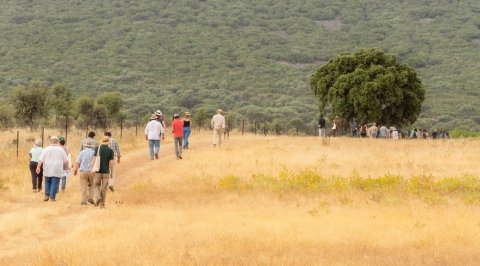“Our future rests in our capacity to adapt” was the motto of the IVth Iberian Congress of the Dehesa and Montado, held last June 15-16 in Badajoz, Spain. Dehesa and Montado are the names respectively given in Spain and Portugal to a complex agroecosystem created by farmers through the domestication of evergreen oak Mediterranean forests. Integrated management of trees, livestock, crops and pastures results in an agrosilvopastoral system with high economic, environmental and cultural values.
Because of the diversity of life forms, species, genotypes, and habitats, Dehesas and Montados are highly resilient but, at the same time, vulnerable to climate change. Strategies and management practices for mitigation and adaptation to climate change are thus a necessity for the long-term persistence and sustainability of this valuable agroecosystem.
Nearly 300 stakeholders from both countries, including farmers, landowners and land managers, NGOs, national and regional government agencies, private companies, and research and academic institutions, gathered at this event to present innovative ideas, share experiences and knowledge, and discuss and debate on how people and the Dehesas and Montados they depend on can adapt to climate change.
The benefits of legumes and rotational grazing for biomass production, pasture quality and long-term carbon sequestration; advances in the selection and propagation of cork oak resistant to the pathogen phytophthora; the productive and ecological benefits from shrubs; tree regeneration practices, and; innovative schemes for payments for environmental services were only a few of the key topics discussed during the first day of the congress.

On the second day, around 75 people participated in a field visit to the dehesa of La Rinconada in Calamonte, doing a farm walk along the so-called “Climate change adaptation route”. Braving suffocating heat, participants observed and discussed on the pros and cons of adaptation measures including, improved pasture, electrical fences for livestock management, smart water trough (to minimize water losses, provides clean water and reduce the risk of transmission of zoonosis from wild to domestic animals), diverse shrub hedgerows, and tree management practices.

The Congress was organized by La Associação de Defesa do Património de Mértola (ADPM), El Centro de Investigaciones Científicas y Tecnológicas de Extremadura (CICYTEX), la Federación Española de la Dehesa (FEDEHESA), el Instituto Nacional de Investigação Agrária e Veterinária (INIAV), Instituto da Conservação da Natureza e das Florestas (ICNF), la Junta de Andalucía, ADENEX y las Universidades de Extremadura (UEX) y Évora (UÉvora), and co-financed by the Project LIFE MONTADO-ADAPT
The event was shown in streaming through Facebook in https://www.facebook.com/CongresoIberico.DehesaMontado/
For more information you can visit https://ivcongresodehesamontado.lifemontadoadapt.com/es/#congreso












